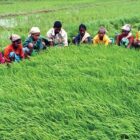The footsteps of the farmer have been replaced by chemical sprays and injections. Green, farm-yard manure and bio-fertilisers have become alien to our farmlands.
Farmers’ Forum is visiting the fertiliser space in one of the most controversial times that the industry has experienced in recent memory. Driven by the need to step up food production, amidst a declining response of productivity to fertiliser input, the government has been forced to concede that something is seriously wrong with the fertiliser regime in India that it has been subsidising at enormous cost to the exchequer. One recalls the Confucian saying: “The best fertiliser on any farm is the footsteps of man”.
Fertiliser curse
There are several perspectives from which this complex question needs to be examined. The fertiliser ministry is charged with the business of changing the system to some form of nutrient-based subsidy, amidst serious talk about decontrol. The government is equally concerned about a mechanism to give the farmer direct fertiliser subsidy though at this point in time it seems to be a distant dream. Meanwhile, the agriculture ministry is most concerned about the impact that all these changes would have on the price line: any adverse impact would be politically unpalatable. The finance ministry, on its part, is worried about the enormous fertiliser subsidy bill. At ₹49,981 crore, as per budgetary estimates for 2010-11, this may have been about ₹3,000 crore lower than the 2009-10 revised estimates of ₹52,980 crore. Yet there was a whopping subsidy leakage in excess of 10 per cent of the total subsidy in 2009-10. That is likely to remain at the same level this year.
Futile farming
Thanks to the poorly-managed monitoring of schemes, leakage and over-charging remain embedded in the administered fertiliser subsidy regime in India. Agriculture, which it is supposed to support, is thus not being able to play the part that it was expected to in an otherwise buoyant economy. In fact, large segments of the affluent farming community are under tremendous financial pressure and tens of thousands of farmers have committed suicide – the worst affected states are Maharashtra, Andhra Pradesh, Karnataka, Madhya Pradesh and Chhattisgarh, which are among India’s more progressive and prosperous states. In many other parts of the country, the farmer is eager to move away from farming and seek any kind of job; in the city or in the government sector.
This is not surprising because the mindsets of those who produce food and that of those who run the food administration of the country are poles apart. The farmer wants a higher net income; a profit from his produce. The government wants more food of the right kind. Without some kind of convergence at this fundamental level, agriculture cannot hope to find its rightful place in the economy. The second basic understanding must be around the inputs for the farm sector, of which fertilisers have occupied the pride of place ever since the Green Revolution with its wonder rice/wheat variety backed by massive and growing fertiliser support. It is difficult to pinpoint when exactly an acceptable use of fertiliser started assuming the monstrous proportions of today and made agriculture a prime culprit in India’s worsening climate change regime and an unacceptable level of soil toxicity.
It needs no rocket scientist to understand that foodgrain production is a land-based activity and the focus should be on the land and the grain. Neither seems to be benefitting from the enormous expenditure on fertiliser subsidy every year. Indian soils are losing their fertility and production capacity. To go back to the Confucian wisdom, conspicuous in its violation here, the footsteps of the farmer have been replaced by chemical sprays and injections. Green, farm-yard manure and bio-fertilisers have become alien to our farmlands. What hope does the small holder-producer and the poor soil have against this assault?
The bottomline? India is losing soil quality that is worth billions of dollars without anyone taking cognisance of it. India is also beginning to literally mine its own territory in its battle on the food security front.




